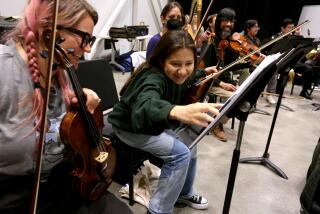Mozartean ‘Messiah’ lacks oomph
- Share via
Part of the fun of listening to Mozart’s arrangement of Handel’s “Messiah” is spotting what Mozart added or changed. This was the version performed Saturday at the Alex Theatre in Glendale as the second collaboration between the Los Angeles Chamber Orchestra and the Los Angeles Master Chorale. Grant Gershon conducted.
Mozart reorchestrated this and three other Handel works at the request of a patron, Baron Gottfried van Swieten, who had an uncommon and profound interest in reviving what was then considered “ancient music” -- music a generation or more old -- for performances in line with contemporary tastes.
Mozart added parts for flutes, oboes, clarinets, bassoons, horns and trombones. He demoted trumpets to harmonic instruments. (The trumpet that sounds in this edition is a French horn.) Loving the soprano voice as he did, he reassigned a number of arias to the soprano. “Rejoice greatly,” on the other hand, is sung by the tenor, not the soprano. For some inexplicable reason, he started three choruses (including “For unto us a child is born”) with the solo quartet; the choir comes in later, sometimes much later.
The melodic lines are longer and smoother, rhythms are less dotted or crisp, vocal embellishments are simpler and fewer, dynamic shifts are greater. The changes are often beautiful but exasperating. The intricate orchestral details, for instance, capture attention, breaking up Handel’s lines.
Whether it was the hall, the change in period style or something else entirely, the performance was sleepy and hugely underpowered. Chorus, orchestra and soloists seemed to be giving 60% of the effort required. The small-voiced soloists were soprano Elissa Johnston, mezzo-soprano Kate Butler, tenor Michael Slattery and bass James Creswell.
More to Read
The biggest entertainment stories
Get our big stories about Hollywood, film, television, music, arts, culture and more right in your inbox as soon as they publish.
You may occasionally receive promotional content from the Los Angeles Times.










